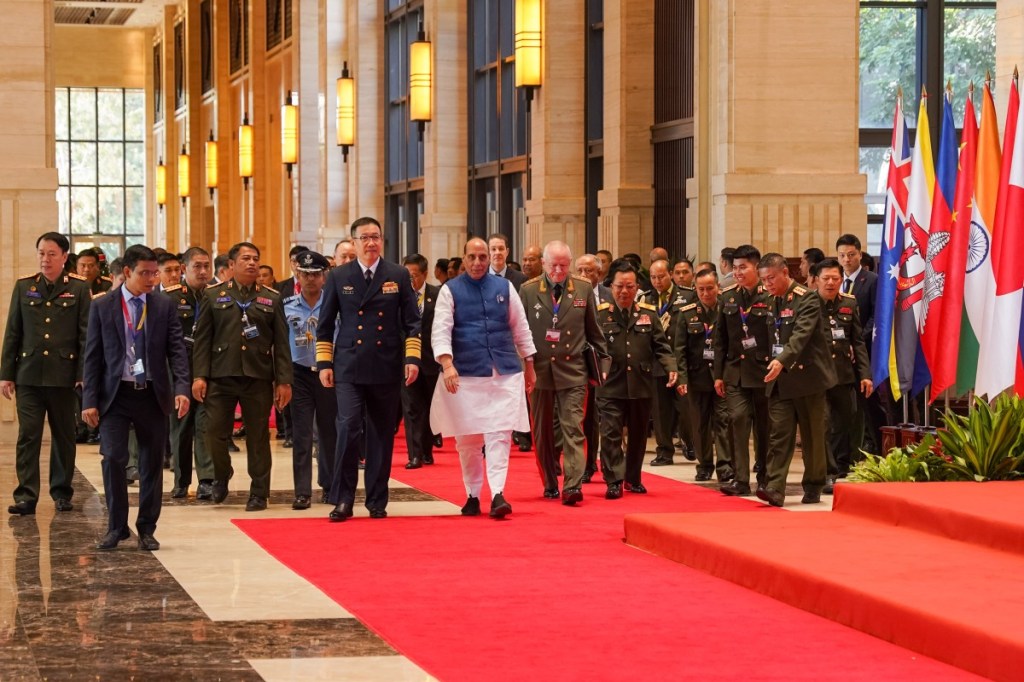At the 11th ASEAN Defence Ministers’ Meeting-Plus (ADMM-Plus) held in Vientiane, Laos, on November 21, 2024, India’s Defence Minister, Rajnath Singh, reaffirmed India’s dedication to upholding international norms, strengthening regional security, and fostering cooperation among nations in the face of growing global challenges.
The Indo-Pacific, a vital region for global trade and security, has seen rising geopolitical tensions in recent years. Amid these challenges, Singh reiterated India’s stance on the importance of a rules-based framework. This includes the fundamental principles of freedom of navigation, unhindered lawful commerce, and adherence to international law. India strongly believes that regional stability can only be achieved when all nations follow established rules, especially as they relate to maritime disputes.
He noted that India supports the formulation of a Code of Conduct in the South China Sea that fully aligns with international law, particularly the United Nations Convention on the Law of the Sea (UNCLOS), ensuring that the rights and interests of all nations, including those not directly involved in the discussions, are respected.
His speech also highlighted the ongoing global struggles that threaten international peace and order. The minister spoke about the increasing polarization of the world into competing blocs and the rising strain on established global systems. In this context, Singh called on the international community to adopt the Buddhist principles of peaceful co-existence, which have long guided India’s foreign policy. These principles, deeply rooted in the history and culture of Southeast Asia, particularly in Laos, stress the importance of non-violence and dialogue in resolving disputes. Singh suggested that these values could help bridge divides and provide a foundation for a more cooperative and peaceful world order.
India’s approach to international diplomacy is rooted in dialogue. Singh reminded the forum that India has consistently advocated for peaceful negotiations as a way to resolve conflicts, whether related to border disputes, regional tensions, or global trade. India’s foreign policy is built on the belief that open communication fosters mutual understanding and trust. The success of India’s diplomatic engagement has been evident in its long-standing relationships with neighbouring countries and its active role in global forums like the United Nations.
The 21st century, Singh pointed out, is widely regarded as the “Asian Century,” with the ASEAN region playing a pivotal role in shaping global economic and political dynamics. India, as a close partner of ASEAN, has continuously worked to strengthen ties with the countries of Southeast Asia. Through initiatives like the “Act East” policy, India has sought to enhance economic, security, and cultural connections with the region. As the defence minister noted, India’s ties with ASEAN are not just recent, but have deep historical roots. Quoting Rabindranath Tagore’s reflections during his 1927 visit to Southeast Asia— “Everywhere I could see India, yet I could not recognise it”—Singh underscored the centuries-old cultural and historical connections that bind India and Southeast Asia.
Singh also addressed a pressing concern for the global community: climate change and its growing impact on international security. He drew attention to the increasing frequency of natural disasters and their far-reaching consequences, including threats to defence infrastructure. Recognizing the critical need for comprehensive action, he called for the ADMM-Plus to deepen its understanding of the links between climate change and security. This could involve developing a defence strategy that focuses on climate change resilience, with multi-stakeholder engagement to safeguard vulnerable populations and protect critical infrastructure.
Finally, Singh spoke about the Global Commons—shared natural resources such as oceans, air, and biodiversity—that are essential for human survival and global prosperity. He stressed the importance of managing these resources in a fair and equitable manner, avoiding unilateral actions that could destabilize the region. Safeguarding the Global Commons, Singh argued, is crucial for sustaining life on Earth and maintaining long-term peace and stability.
The 11th ADMM-Plus forum, which includes ASEAN members, Plus countries, and Timor Leste, serves as a key platform for fostering regional security and cooperation. India’s commitment to a rules-based international order, as articulated by Singh, is crucial not only for addressing immediate security challenges but also for laying the groundwork for a more peaceful, cooperative, and prosperous future in the Indo-Pacific and beyond.
India’s consistent message at the ADMM-Plus, emphasizing dialogue, respect for international law, and shared responsibility, underscores its role as a key advocate for a stable global order. By building strong, cooperative relationships and upholding the principles of justice and fairness, India continues to play an essential role in shaping a peaceful and prosperous world.

